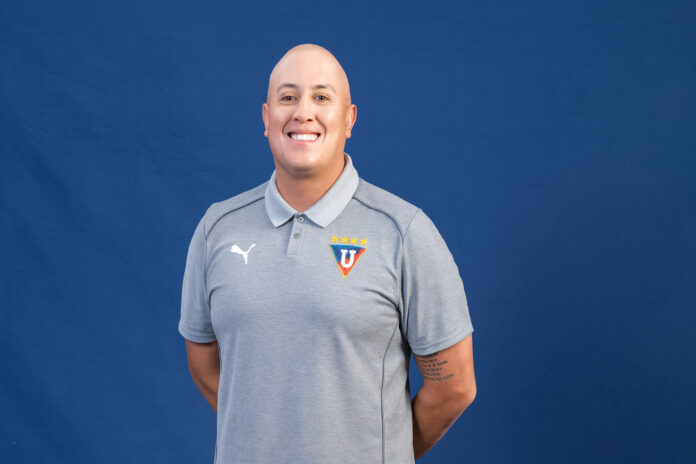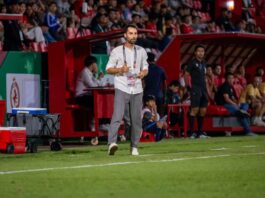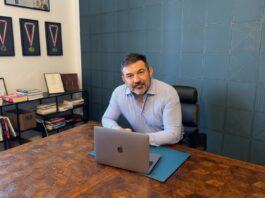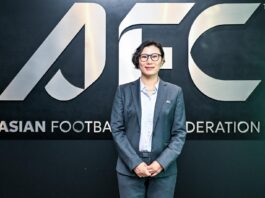
Diego Vilela Alcalá is a football coach and sports director with a strong academic and professional background in talent development, tactical analysis, and player optimization. Born on November 15, 1991, in La Paz, Bolivia, he has built an international career that bridges coaching, methodology, and sports management.
Vilela holds a Law degree from Bolivia, complemented by advanced academic credentials in football and sports management: UEFA Pro (Level 3) coaching license in Spain, a Master’s in Youth Academy Management (Madrid), and an MBA in Sports Institutions and Facilities (Ávila). His education has given him a unique blend of legal, technical, and managerial expertise within the football industry.
Professionally, he has accumulated diverse experience across Spain, South America, and global football organizations. Early in his career, he coached at grassroots and youth levels in clubs such as Club Villaverde Boetticher, UD San Sebastián de los Reyes, Adepo Palomeras, and AD La Meca de Rivas, progressing from U-12 to U-19 categories. His trajectory then led him to Atlético de Madrid, where from 2018 to 2021 he served as a methodology coordinator, individual optimization lead, and tactical analyst, contributing to the development of academy players at one of Europe’s elite clubs.
In 2022–2023, he coached the U-19 National Youth Category at C.D. Isoba, strengthening his practical expertise in talent identification and methodology. His career further expanded globally through his work at City Football Group Academy (2023), where he contributed to modern approaches in player development. In 2024, he joined Liga Deportiva Universitaria de Quito (LDU Quito) as part of the technical structure, expanding his presence in South American football at a top-level institution.
Beyond coaching and methodology, Vilela is active in education and knowledge-sharing. He has authored books, contributed to tactical analysis through video and data, and lectures at “La Pizarra del DT” in courses focused on football management and youth development. Fluent in Spanish and English, he is equipped to work in international environments and engage with multicultural teams.
Diego Vilela Alcalá stands out as a modern football professional who integrates coaching, management, and academic knowledge. His work consistently focuses on developing players, structuring methodology departments, and optimizing performance, making him a valuable asset for clubs aiming to strengthen both their academies and competitive structures.
Our Exclusive Interview with Diego Vilela Alcalá
Working at Atlético was a transformative experience. I was able to contribute as a methodology coordinator, individual optimization coach, and academy coach in one of the most demanding academies in Europe.
What motivated you to transition from law into football coaching and management?
Since I was young, I’ve always had two passions: academics and football. I first chose to study Law because it gave me a solid foundation in critical thinking, negotiation, and legal knowledge. However, football was always my true driving force. I realized I could contribute more by combining both areas: my legal and academic background with practical experience in coaching and management. That combination provided me with tools to understand football not only from the tactical and methodological side but also from the structural, organizational, and strategic perspective.
How did your time at Atlético de Madrid shape your philosophy in player development and methodology?
Working at Atlético was a transformative experience. I was able to contribute as a methodology coordinator, individual optimization coach, and academy coach in one of the most demanding academies in Europe. There I understood the importance of processes, consistency across age groups, and the fact that every methodological decision must align with the club’s model. Atlético taught me discipline, organization, and how to embed a playing style into every stage of development without losing sight of individual growth.
What are the main differences you’ve observed between youth development in Spain and South America?
In Spain, there is a consolidated methodological structure that has been in place for decades, with clear processes, continuity in coach education, and a scientific approach to player progression. In South America, on the other hand, there is an abundance of natural talent and creativity, but often a lack of organizational structure and methodology. My work seeks to build bridges: taking advantage of South America’s talent while applying European-style structures that guarantee sustainability and long-term development.
Today’s football is so competitive that collective training alone is not enough. Tactical analysis and individual optimization allow us to refine details that make the difference at the elite level.
In your view, what role does tactical analysis and individual optimization play in modern football?
Today’s football is so competitive that collective training alone is not enough. Tactical analysis and individual optimization allow us to refine details that make the difference at the elite level: from decision-making to load management and improving specific on-field behaviors. I firmly believe the future lies in combining the collective with the individual, which is why I always insist that each player should have a personalized development plan within a global game model.
Can you tell us about your experience with City Football Group Academy and how it influenced your approach?
My time at the City Football Group Academy gave me a global and modern perspective on player development. There I witnessed how technology, data analysis, and multinational projects are integrated into talent development. It was a key learning experience to understand how to scale processes, use performance indicators to make decisions, and link methodology to a football business model. It reinforced my belief that technological innovation must serve the player, not the other way around.
What are your long-term goals in football, both on the pitch and in sports management?
In the long term, my ambition is to focus on forming and mentoring coaches, and on structuring strong processes both in academies and first teams. My goal is to help clubs become self-sustaining by developing, promoting, and selling the talent they nurture in their academies, while also building solid performance frameworks at the professional level. I want to leave a legacy by ensuring that every project I’m part of has a robust structure that supports sustainable growth and long-term success.



